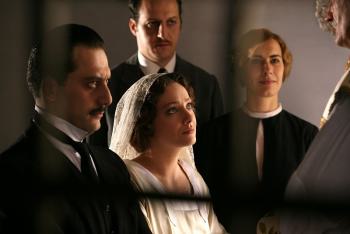- MENU
- HOME
- SEARCH
- WORLD
- MAIN
- AFRICA
- ASIA
- BALKANS
- EUROPE
- LATIN AMERICA
- MIDDLE EAST
- United Kingdom
- United States
- Argentina
- Australia
- Austria
- Benelux
- Brazil
- Canada
- China
- France
- Germany
- Greece
- Hungary
- India
- Indonesia
- Ireland
- Israel
- Italy
- Japan
- Korea
- Mexico
- New Zealand
- Pakistan
- Philippines
- Poland
- Russia
- South Africa
- Spain
- Taiwan
- Turkey
- USA
- BUSINESS
- WEALTH
- STOCKS
- TECH
- HEALTH
- LIFESTYLE
- ENTERTAINMENT
- SPORTS
- RSS
- iHaveNet.com: Movie Reviews

One of the most surprising things about "Vincere" -- the story of Ida Dalser, Mussolini's secret wife, and his first-born son, Benito -- is that when the relationship went sour and Ida just wouldn't let it rest, Il Duce just didn't have her killed.
Though Ida's life would become a torturous hell in an insane asylum, the legacy left by her letters has made for an intense and intriguing, if at times uneven, film with Italian director Marco Bellocchio wringing every drop of emotion out of his actors and his audience.
The passion is palpable from the first frame, as Ida, played with exquisite anger by Giovanna Mezzogiorno, first spots Mussolini (Filippo Timi in frightening form). Watch in hand, he's giving God five minutes to prove his existence by challenging the almighty to strike him dead -- an early glimpse of the facile manipulator he would become -- while she's just a face in the crowd.
That Bellocchio imagines the couple's first real encounter as a stolen kiss in the street, with Mussolini's head bloodied from a confrontation between police and protesters, sets the tone for a relationship that would be defined by the forces of lust, power and pain.
The story unfolds on two levels -- the personal and the public -- with Bellocchio moving between the two to sometimes confusing effect. To tell of the growing unrest in Italy and Mussolini's rise along with the
As a filmmaker for almost 50 years, Bellocchio has long been intrigued by politics and political figures, and he brings all that to bear in "Vincere." Early on there is a lot of cutting back and forth in time, as Bellocchio, who wrote the film as well, pieces together the many details of their complicated back story, much of it drawn from recent documentaries and books on Ida's existence. But with the break in their relationship comes clarity, and the film finally finds its footing.
Mezzogiorno channels the passion of their torrid affair into the unrelenting defiance that would sustain Ida over time. There is a moment when one of the nuns in the asylum leaves the door of her cell open. She scoops up all the letters she's written to officials decrying her plight and throws them through the bars and out into a snowy night. As the letters fall with the snow, hope should die as well, but there is an electricity in Mezzogiorno's portrayal.
Almost as powerful on-screen is Timi, who is chilling as Mussolini. What is even more affecting is later in the film when Timi steps into the role of Ida's son as a young man. Like his mother, Benito becomes an irritation and is also locked away. The images of him imitating his father, intercut with footage of Mussolini playing to the crowd, are riveting, the parody frighteningly on point.
MPAA rating: No rating.
Running time: 2:02.
Cast: Giovanna Mezzogiorno (Ida Dalser); Filippo Timi ( Benito Mussolini); Fausto Russo Alesi (Riccardo Paicher); Michela Cescon (Rachele Mussolini); Fabrizio Costella (young Benito Albino).
Credits: Directed by Marco Bellocchio; written by Daniela Ceselli and Bellocchio; produced by Mario Gianani. An
Vincere Movie Review - Giovanna Mezzogiorno & Filippo Timi